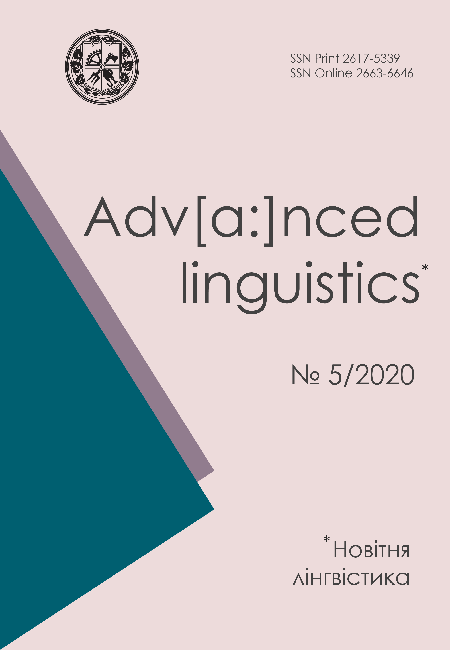ТRANSLATION PECULIARITIES OF SWEAR WORDS IN THE SUBTITLES TO FILM “FACK JU GÖHTE”
DOI:
https://doi.org/10.20535/2617-5339.2020.5.200715Ключові слова:
swear words, film translation, audiovisual translation, subtitling, translation transformations, intercultural adaptation.Анотація
The article analyzes the peculiarities of the translation of German-language subtitles with the swear words into the Ukrainian language. The basic translation transformations, which a translator can use by transmitting obscene words and expressions during the movie translation are considered. The analysis was made of subtitles in English and Russian for the German comedy film “Fack ju Goethe” and a translation of the subtitles into Ukrainian was offered as well. The research identified major difficulties and possible mistakes by translating swear words into foreign languages.It is noted that audiovisual translation is a synthesized process of reproduction and adaptation of video material (film, series, TV show or videos available on the Internet) for the audience of foreign language culture, as a result of which the video material becomes clear and accessible to the recipient and transmits the original. According to the results of the analysis, the difficulty of translating obscene lexical items in films lies in the intercultural adaptation of the language of the characters to the linguistic culture of the target recipient, i.e. the ability to interpret replicas of foreign films so that they come as natural to the viewer. Our vision of solving problems regarding audiovisual translation in the Ukrainian linguistics, in particular in the discourse of the non-normative layer of vocabulary, has been formed.
Посилання
Buzhykova, R. I., & Kovalova, A. S. (2019). Domestykaciya ta forenizaciya pid chas kinoperekladu [Domestication and phorenization during film translation]. Scientific journal of the National Pedagogical University named after M. P. Drahomanov, 8(11), 3–6.
Gavryliv, O. M. (2005). Nimeczko-ukrayinskyj slovnyk lajlyvyx sliv [German-Ukrainian dictionary of abusive words]. Lviv: Apriori.
Zakon Ukrainy “Pro zabezpechennya funkcionuvannya ukrayinskoyi movy yak derzhavnoi” [Law of Ukraine “On ensuring the functioning of the Ukrainian language as the state language”]. №21, § rozd. V st. 23, p. 6. (2019).
Kleputz, L. O. (2009). Strategii klasyfikacii nenormatyvnoi leksyky [Strategies for classification of profanity]. Humanities and Social Sciences, (14–16 May), 84–87.
Matiushenko, O. S., & Turysheva, O. O. (2019). Lingvistychnyj status obscenizmiv u nimeczkij movi [Linguistic status of obscenisms in the German language]. Naukovyj visnyk Mizhnarodnogo gumanitarnogo universytetu, 37, 64–66.
Radetzka, S. V., & Kalishchak, T. T. (2016). Subtytruvannya yak vyd audiovizualnogo perekladu: perevagy ta nedoliky [Subtitling as a type of audiovisual translation: advantages and disadvantages]. Naukovi zapysky NDU im. M. Gogolia, 2, 81–84.
Stavytska, L. O. (2008). Ukrayinska mova bez tabu: Slovnyk necenzurnoyi leksyky ta yiyi vidpovidnykiv [Ukrainian language without taboos: Dictionary of obscene language and its equivalents]. Kyiv: Krytyka.
Duden Online-Wörterbuch. (n. d.). Abgerufen aus https://www.duden.de/woerterbuch
Lysenko, H. L., Baklan, I. M., & Chepurna, Z. V. (2019). Grundlagen des Übersetzens: eine Brücke zwischen Theorie und Praxis (deutsch-ukrainische Richtung): Lehrbuch. Kyiv: Igor Sikorsky Kyiv Polytechnic Institute, Verlag “Politekhnika”.
Moritz von Uslar. (2013, Dezember 5).Geisterkranker! Die Teenagerkomödie “Fack ju Göhte” ist der erfolgreichste deutsche Film des Jahres. Eine Sprachkritik. Abgerufen aus https://www.zeit.de/2013/50/teenagerkomoedie-fack-ju-goehte-sprachkritik
Oxford Learner’s Dictionaries. (n. d.). Retrieved from: https://www.oxfordlearnersdictionaries.com/
Wichmann, A. (2009). Tabu-Deutsch – unzensiert: von “Arsch” bis “Zickenalarm”: mehr als 200 Wörter, die Sie nicht so schnell vergessen werden! München: Spotlight-Verlag.
##submission.downloads##
Опубліковано
Номер
Розділ
Ліцензія
Наше видання використовує положення про авторські права CREATIVE COMMONS для журналів відкритого доступу.
Автори, які публікуються у цьому журналі, погоджуються з наступними умовами:
1. Автори залишають за собою право на авторство своєї роботи та передають журналу право першої публікації цієї роботи на умовах ліцензії Creative Commons Attribution License, котра дозволяє іншим особам вільно розповсюджувати опубліковану роботу з обов'язковим посиланням на авторів оригінальної роботи та першу публікацію роботи у цьому журналі.
2. Автори мають право укладати самостійні додаткові угоди щодо неексклюзивного розповсюдження роботи у тому вигляді, в якому вона була опублікована цим журналом (наприклад, розміщувати роботу в електронному сховищі установи або публікувати у складі монографії), за умови збереження посилання на першу публікацію роботи у цьому журналі.

